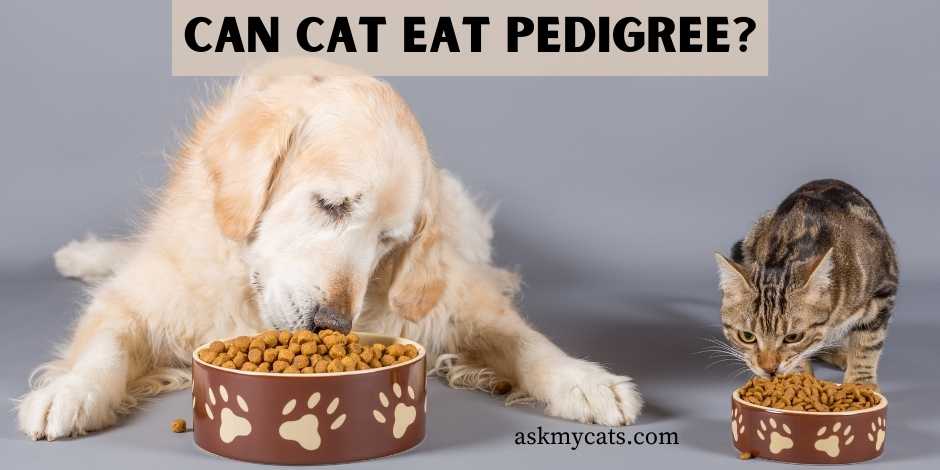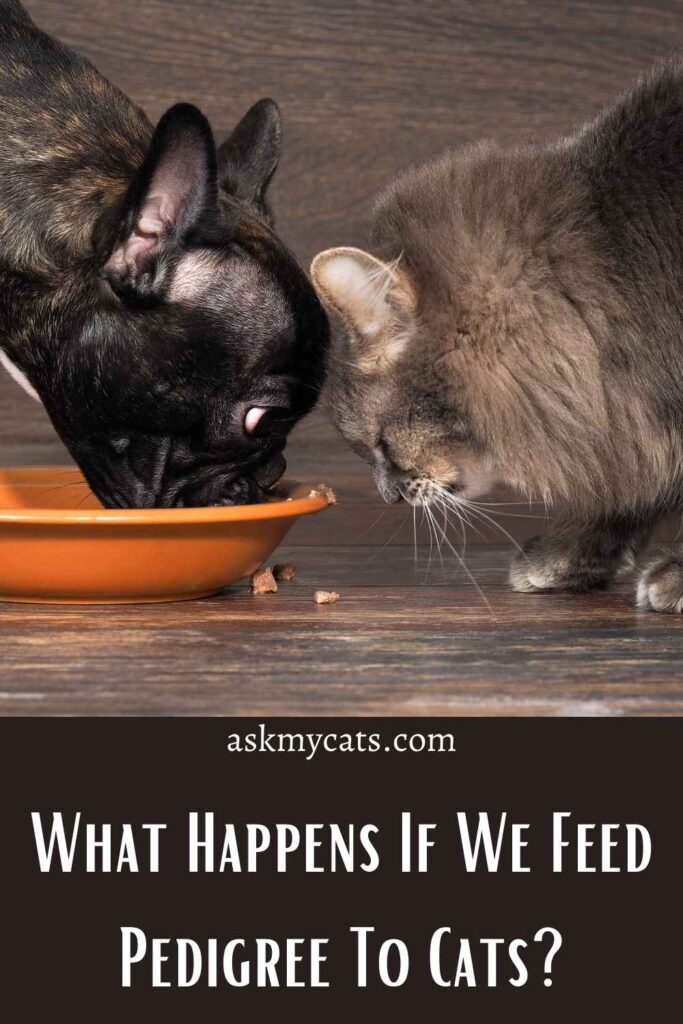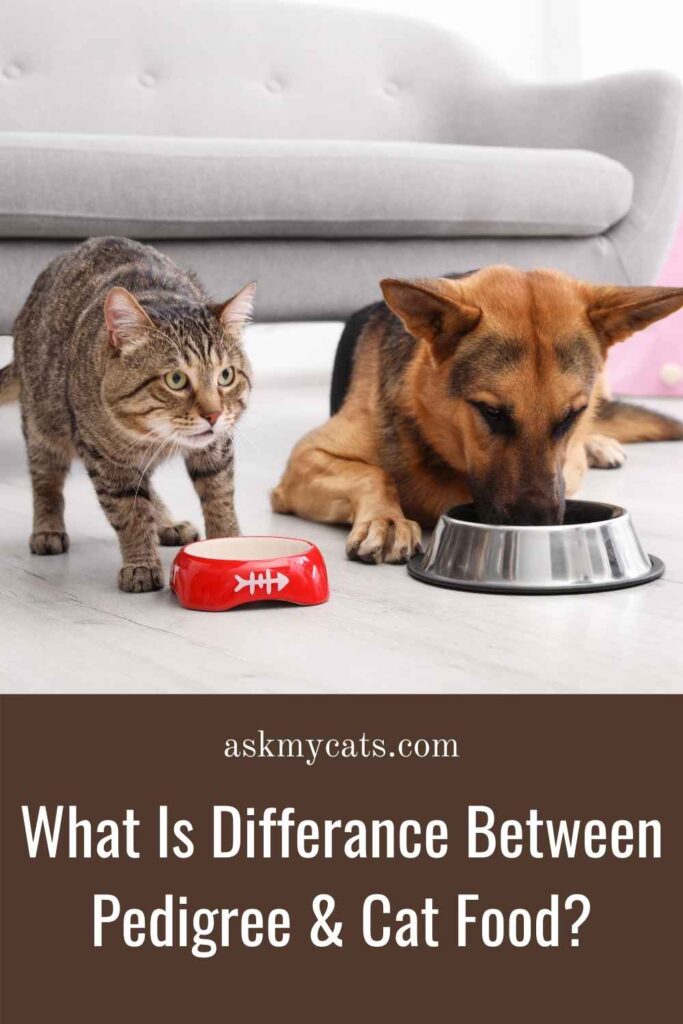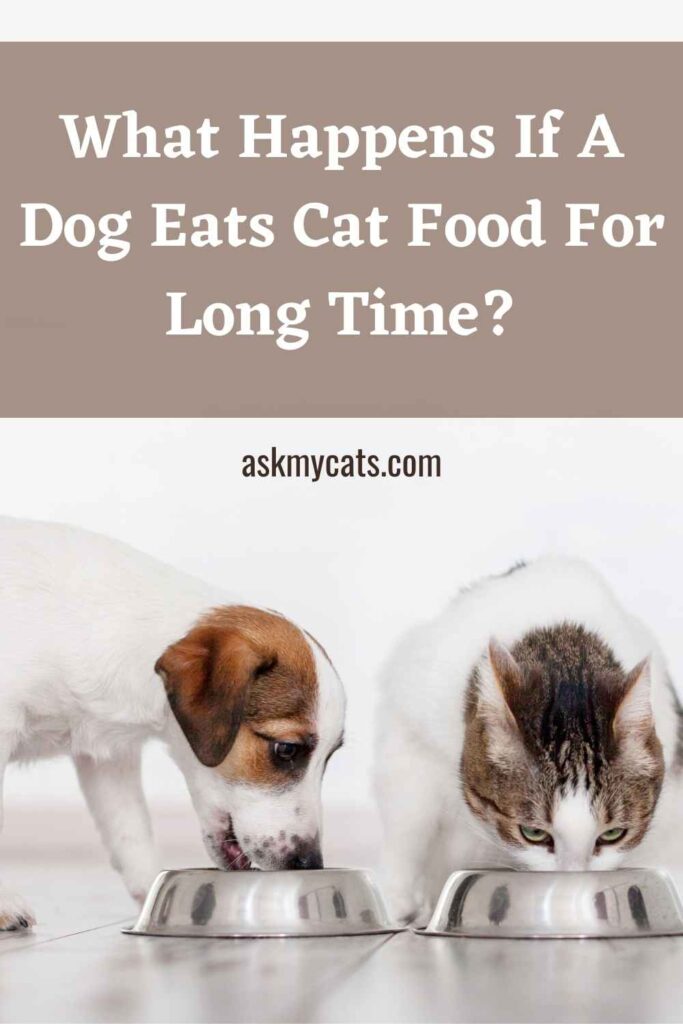It is not advised to feed cats pedigree because cats have different dietary requirements than dogs and can become malnourished if given a dog diet.
While an unintentional chomp of your dog’s meal is unlikely to harm your cat, long-term consumption of dog food seems to be.
Feed your cat only food labeled for cats to ensure a good diet.


Give Your Cat the Perfect Day
Get the Free Ebook!
Can Cats Eat Pedigree Dog Food?
No, cats can not eat a pedigree for the long term because dog food is formulated much like an omnivore diet with less focus on nutrition, whereas cat food has higher protein to fat ratios and resembles a carnivorous diet.
Taurine deficiency is likely to hit your cat If you give it dog food for a long time. It affects almost every organ in your cat’s body, from the eyes to the brain.
Many of the most well-known dog food manufacturers have taurine in their product lists, but only in limited doses for cats and at a high expense.

1. Proteins- The Building Blocks Of Creation
Dogs are omnivores, so they can get their foods from both plant and animal sources.
Cats, unlike dogs, are obligate carnivores, which means they must consume animal-based proteins in order to live and sustain their well-being.
According to the Association of American Feed Control Officials’ nutritional profiles, dog food must contain at least 18 percent protein. This is 8% less protein than the required protein allowance for cat food, which is 26%.
Not only does dog food contain less protein than cat food, but it may also be derived from plant foods, depriving your cat of the nutrition she needs to remain healthy.
2. Essential Amino Acids
According to the Virginia-Maryland Regional College of Veterinary Medicine, animal-based proteins like meats and meat by-products are made up of 23 different amino acids, 11 of which your cat requires to survive.
These 11 essential amino acids cannot be synthesized by a cat and must be consumed in order for her to stay healthy; dogs, too, need them, but not all of them.
Taurine is one such amino acid that is not needed by AAFCO to be used in dog food.
The body of a dog can produce taurine, but the body of a cat cannot.
Unfortunately, if a cat eats dog food, she will be deficient in this essential amino acid and may become ill as a result.
3. Other Ingredients
Cats need both arachidonic and linoleic acids in their diets from animal-based fats, whereas dogs only need linoleic acid.
According to the American Society for the Prevention of Cruelty to Animals, dog food lacks arachidonic fatty acid, which is needed to keep your cat’s coat and kidneys healthy.
Cats and dogs need varying levels of vitamins and minerals in their diets for good feeding. Dogs require fewer B vitamins, such as niacin and thiamine, as well as less folic acid than cats.
According to the FDA, their diet contains fewer of these compounds. If your cat eats diets that are nutritionally healthy for dogs, this will result in a deficit in them.
4. Cats On An Inappropriate Diet
Feeding your pet an unhealthy diet, such as dog food, will cause a number of health problems. A deficiency of taurine, which is not present in dog food, can cause blindness, heart attacks, and deafness.
Lethargy, seizures, poor posture, poor hair condition, diminished fertility, and even mortality are all potential side effects of a vitamin imbalance in cats.
Furthermore, if your cat consumes a lot of dog food, the inappropriate combination of proteins, carbohydrates, vitamins, and minerals can trigger gastrointestinal distress.
A couple of bites of dog food here and there won’t do any harm to your cat’s welfare, but regular snacking on your dog’s food can.
If she eats so much of your dog’s food, she won’t have enough space in her stomach for her own food, which is good for her health.
5. Time to Feed
When you have a cat and a dog in the home, you must make sure that each animal consumes only her own food.
Although having free access to a big bowl of food for your dog is convenient, it might not be realistic if your cat is continuously nibbling on his food.
Feed the dog two meals a day, meeting the pet food manufacturer’s normal calorie consumption recommendations.
During your dog’s feedings, keep an eye on him and make sure your cat doesn’t come over and eat any of the food. Since cats eat up to 12 to 20 times a day, free-feeding could be the best choice for your kitty.
To prevent your dog from eating your cat’s food, place it on a countertop, shelf, or table that your dog cannot reach. After all, giving your dog pet food is just as bad as giving your cat dog food.
Is Pedigree Good For Cats?
Although cats can eat pedigree dog food occasionally without any major issues, pedigree dog food is not good for your cat if given for a long term.
Pedigree dog food is bad for your cat in the long term because the nutritional requirements of your cat are different from your dog.
As discussed before, cats are carnivorous and required mainly meat-based proteins and animal fat in their diet for the healthy functioning of the body.
Whereas on the other hand dogs are omnivorous with a more flexible diet and can easily digest meat as well as vegetables and grains.
So pedigree dog food is prepared with the diet requirements of dogs in mind resulting in not-so-good diet supplements for your cat.
What Is the Difference Between Pedigree & Cat Food?
It’s possible the canned cat and dog food look and smell the same, prompting you to believe they’re made up of the same or very similar ingredients but the content figures on cat and dog food cans are different.

This ensures that feline and canine diets are intended to fulfill the dietary needs of their respective animals. Different levels of vitamins and minerals are needed and metabolized by cats and dogs.
Certain essential acids and proteins, such as vitamin A, can be synthesized by dogs.
Cats must derive these nutrients from animal tissues through their diet, while dogs convert vitamin A from beta-kerotene in fruits and vegetables.
While dogs and cats need different quantities of calcium and phosphorus in their diets, their needs rise during development, pregnancy, and lactation, and their diets should reflect this.
The percentages of protein and fat in most pet foods are listed on the packaging.
When you compare the contents mentioned on each label with your limited free time, you can see numerous variations.
The protein and fat content in cat diets is greater than that of dog foods.
According to some scientists, the main distinction between cats and dogs is that cats are true carnivores, requiring a diet of meat and meat items, while dogs are omnivores, requiring a diet that includes both meat and plant products.
Dogs, on the other hand, can digest and metabolize both plant and animal diets, but they are also carnivores who require meat to survive.
Carbohydrates aren’t needed in your cat’s diet as long as she gets enough protein and fats.
While certain people believe that dogs don’t need much other than meat and bone, carbohydrates from digestible or soluble fibers, such as beet pulp, may help them digest their diet and retain healthy stool consistency.
On the other hand, too much crude fiber in cat food can be harmful, as it can increase feces intake, interrupt fermentation, glucose absorption, and insulin production, and reduce diet digestibility.
Taurine, an amino acid contained in body tissues, is essential for your pet’s heart, retina, bile, and certain facets of reproduction to function properly. It’s important that this amino acid is available and preserved in feline food.
Cats can’t make taurine on their own, so they have to eat meat to get it.
They can cause cardiac and respiratory problems, as well as blindness if they don’t get enough taurine. Taurine deficiency is not a challenge for most dogs since they can synthesize taurine from enough amino acids in their bodies.
Some dog breeds, however, are unable to adequately metabolize taurine and can produce an enlarged heart unless taurine is included in the form of vitamins or diet.
Often cats are averse to eating dog food. Cats claim their diet is not only superior to human food but also superior to dog food.
On the other hand, most dogs believe that something that comes out of a can is edible, potentially delicious and certainly made for dogs.
The truth is that canned dog and cat food should be made in a manner that your pet enjoys while still including the necessary ingredients and nutrients he or she requires to develop, remain healthy, and survive.
What Happens If Cat Eat Pedigree
If a cat eats pedigree cat food accidentally, it is nothing to worry about as pedigree dog food is not harmful to your cat if taken occasionally or accidentally.
There is not a single substance in a pedigree that can be troublesome for your cat’s health if taken by the cat accidentally.
In reality, a problem arises when your cat takes the dog food for the long term because dog food does not satisfy the nutritional requirements of your cat.
Can Cats Eat Dog Food In An Emergency
YES. You can surely give your dog food to your hungry cat in an emergency without any risk of health issues.
There might be some instance when you are running out of your cat food and you can’t go to buy new cat food. And in this scenario, you can give your dog food to your cat in an emergency.
Rule of Thumb:
Occasional dog food never create any issues in your cat, but long term feeding of dog food to your cat will hamper the health of your cat.
What Happens If A Dog Eats Cat Food For A Long Time?
While a small amount of your cat’s food won’t harm your dog, if he eats cat food as his only source of nutrition, he will develop health problems over time. Dogs and cats need various types of diet, and cat food isn’t well balanced for puppies.

Since cats are obligate carnivores, which means they must consume meat from plants, they require a higher protein diet than dogs.
Dogs, on the other hand, are omnivores that do not need as much protein as cats and do not need the bulk of their calories to come from animal sources.
To satisfy your dog’s basic dietary requirements, commercial dog food must contain at least 18 percent protein.
According to the US Food and Drug Administration, this need was determined by the nutrient profiles identified by the Association of American Feed Control Officials.
Cat food has a minimum protein content of 26%, which is 8% higher than dog food.
Cat food not only has more protein than dog food, but it also has a higher fat content.
According to the FDA, a minimum of 5% fat in dog food and 9% fat in cat food is recommended by AAFCO.
Although this does not seem to be a significant change, the higher protein and fat content means the dog can need more calories. If he eats such high-calorie foods for an extended period of time, he will become obese.
According to the Veterinary Associates, since your dog’s digestive tract was not equipped to absorb fatty foods, it will induce stomach upset, vomiting, and diarrhoea in your pet.
Furthermore, cat food provides an unbalanced mix of vitamins and minerals for your pet, resulting in deficiency or excesses of these nutrients.
Cat food, for example, has less zinc and vitamin E than dog food. Taurine is also present in cat food, which is not needed in the diet of dogs.
These dietary variations may have a long-term impact on your dog’s general health. Dogs need more carbohydrates than cats and would be unable to obtain the nutrients they need if these foods are not used in their diet.
Your dog will get calories from a diet that contains almost 50% carbs, while a cat gets the rest of her energy from fats.
High-protein foods, similar to those used in pet food, are ideal for healthy, show dogs or developing puppies, but not for elderly or sick dogs. This kind of food is difficult for your child to eat.
If your dog has kidney failure, a high-protein diet will place a lot of tension on his kidneys, making his condition worse. High-protein diets aren’t approved for diabetic dogs and health problems like diabetes can affect the dog’s kidneys.
To stop health problems, feed your dog food made specifically for pets. If you also have a pet, your dog can find it difficult to avoid the lure of your cat’s food.
Feed your cat in a different space so your dog can’t get to it or on a high shelf or counter to keep your dog from stealing your cat’s food. Observe feedings to ensure that each pet consumes his or her own food.
Also, check out can cats eat baby food
Can Cats Eat Pedigree Wet Dog Food?
No, you cannot feed your cat pedigree wet dog food since illness will hit your cat’s immune system. The reality is that whether a cat eats pedigree wet dog food, it is of no great importance.
For a lengthy period of time, any animal would be unable to obtain the necessary amounts of nutrients.
Many people keep all of their pets’ feeding bowls in the same place for convenience and sanitation. It’s not unusual for one of them to eat the other’s food if we don’t keep a close watch on them.
It could be that they’ve eaten their own and are still hungry, or it could simply be that they’re interested. If food poisoning is a risk, certain people can become panicked and concerned.
If you make it a habit, the cat may get ill and could have some serious long-term health problems.
Can Cats Eat Pedigree Dentastix?
Yes, cats can eat Pedigree Dentastix because Dentastix from Pedigree is really good for your pet. They’re both low in fat and sugar. This ensures they’re a good reward and a vital part of pet healthcare for keeping your cat’s teeth clean and solid and healthy gums.
Pedigree Dental Sticks are intended to be chewed for a lengthy period of time. As a result, you must pay close attention to how long the dog has been chewing on them.
Your dog is having the most out of the Pedigree Dentastix Small Dog Treats whether he or she takes their time chewing on the treat.
If they eat the treat like a slice of leftover chicken, though, they won’t profit from the properties of these doggy dental chews.
Frequently Asked Questions
Can cats eat dog dental sticks?
Check out any dog chews if you can’t find the right chew for your pet. The majority of dog chews are safe for cats as well; they are only a little bigger and heavier. Instead of biscuits and dental bones, opt for single-ingredient animal ingredients. They’re frequently made up of wheat or starches, which are difficult for your cat to eat.
Can you get dental sticks for cats?
Cat dental chews and special dry food diets of fiber that scrape the surface of your cat’s teeth when they chew are also available.
Will dog food make cats sick?
A small amount of dog food would not harm your pet. Dog food, on the other hand, is not a suitable replacement for cat food. Many of the ingredients are the same in both. Pet food, on the other hand, is specifically designed for a cat’s nutritional requirements, which contains more protein as well as specific vitamins and fatty acids.
Final Words
Cats can eat dog food for a limited time, but not indefinitely. When the pets swap food for a brief amount of time, there is no need to be worried.
While a single nibble of your dog’s food won’t harm your pet, long-term feeding of dog food will cause malnutrition in your cat.
Let us know in the comments section below if your cat has accidentally consumed dog food? Were there any side effects? Share your thoughts.
